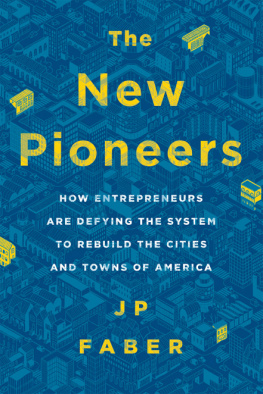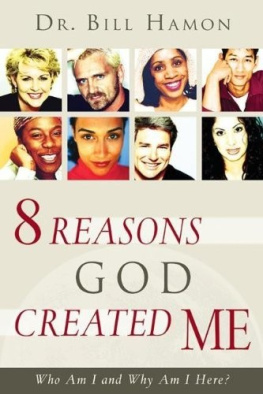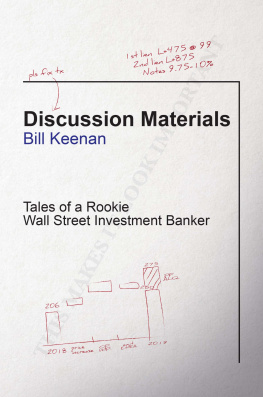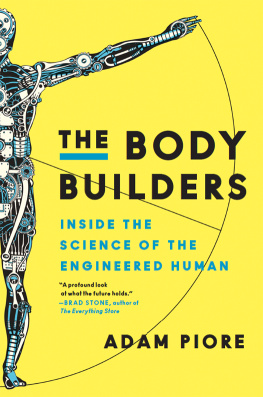

Contents
For Zach and Mollie
CHAPTER ONE
Finding
the Cathedral Within
I
I recently received a handwritten letter from a friend who left his job. He wrote, What I want to do next, in addition to making some dough, is something that counts.
He is forty-three years old, has three young sons, and lives in the Washington suburb of Silver Spring, Maryland, where I also live. Weve known each other more than a decade, having crossed paths in various political campaigns. Hes been a small but steady contributor to Share Our Strength (SOS), the antihunger and antipoverty organization I founded, his check always accompanied by a heartfelt note complimentary of our work. His current stationery is distinctive, and when I saw his letter on top of a tall stack of mail on my desk, I wasnt sure what to expect. (Actually I dont have a desk. I sit at the same folding table Ive used since SOS began fifteen years ago. Theres more room for my legs and Im too sentimental or superstitious to give it up. Besides, along with the rest of the nonmatching furniture thats been donated to our office, it reassures donors that were spending their money the right way.)
Something that counts. Its a revealing phrase. It holds the promise of both higher purpose and lasting result. Theres an earnestness in its simplicity and plainspokenness. Its especially revealing when its got the gold seal of the president of the United States embossed above it.
My friends name is Mike McCurry. For three years he served as Bill Clintons press secretary and managed to satisfy both the president of the United States and the press corps covering him. He left to a chorus of favorable reviews, culminating in NBC anchorman Tom Brokaw ending a nightly newscast with an affectionate Good job, Mike.
Im intrigued that Mike didnt say he wants to continue doing something that counts, but rather that its what he wants to do next. Mornings in the Oval Office, afternoons on Air Force One, and evening appearances on every television screen in the country would qualify, for some people. The White House is where the action is, the center of our national attention. Events in far corners of the world are influenced by what does or does not happen there. If working in the West Wing at a senior level doesnt count, then what does?
Dont get me wrong. I think McCurry loved being presidential press secretary. This was a job he not only coveted, but methodically groomed and prepared himself for over many years, and one at which he excelled. Starting with John Glenns presidential campaign in 1984, then Bruce Babbitts in 1988, and finally Senator Bob Kerreys in 1992, McCurry both learned the ropes and paid his dues. He managed to emerge from each loss with his good humor intact and his reputation enhanced. Ultimately, he accepted the post of spokesman for Secretary of State Warren Christopher, mastering the details and nuances of foreign policy and confidently handling the press corps. The State Department was a staging ground to catch the attention of the president, whose 1992 campaign he had opposed. When Clintons first press secretary, Dee Dee Myers, left the White House, McCurry was brought in.
McCurry managed to weather the Clinton scandals and maintain not only numerous friendships in the press corps but, more important, his integrity. By the time he left, he was a well-known and well-liked TV personality. There were invitations to give speeches, write books, and lobby, as well as many other lucrative opportunities. As anyone in his position would, he took some of them. Hes savvy enough to have no illusions about either his celebrity or the value he can derive from it in a celebrity-conscious marketplace. When he talks about doing something that counts, hes not referring to societys definition. He means something that counts to him.
Doing something that counts. Something that not only makes a difference, but has a lasting impact. Its a basic human need, like water or calcium. We can actually get by with surprisingly little of either, but we hold together better and longer when we get regular servings of each. Wait, Ill go further; theres a better analogy. We need it like we need love. Its the need we arent sure how to talk about, the one that makes us feel... whole.
This goes to the very heart of what Share Our Strength means and does. Everyone has a strength to share. Often it is a skill or talent theyve come to take for granted, but one that can make a difference in the life of somebody else if properly deployed. Mentors share strength. So do tutors, coaches, and doctors. Chefs who teach nutrition to low-income families are sharing strength, as are college students who read to children in preschool Head Start programs. Sharing strength is as valuable as donating money. Sometimes its worth more, because it cannot be bought.
All of us have strengths we need to share. The challenge lies in creating vehicles that enable diverse individuals to do so, especially that vast majority who may not think of themselves as community activists, civic leaders, or social entrepreneurs, or as part of a broader national service movement. Its not just about volunteering or trying to be a better person. Its not about making your community a better place. Its not about service being good for your soul. It is more fundamental, almost primal. It is what the species instinctively wants to do: to perpetuate itself by leaving something behind; to make a mark that lasts; to make ourselves count.
Each day the mail at SOS brings pleas for money, but each day also brings pleas for meaning. I get a lot of letters like Mike McCurrys from college students and corporate executives, from mothers whose children are grown, and from businesspeople who have enjoyed prosperity but not necessarily purpose. They say they want to give something back, to find a way to contribute that will be meaningful and make a difference. What they want to know is how.
There have always been such people among us: generous, altruistic, even idealistic. In recent years, their numbers have grown, but so have the opportunities to serve. Right now, the potential to bring about lasting change is greater than ever before, and so is the need. Today, there is another generation of Americans that desperately needs help: the generation of children who are poor, vulnerable, and destined to repeat a familiar cycle of dysfunction and despair that is incongruous and unnecessary in a prosperous America.
Historically, when faced with crisis, our society and government have respondedhowever untimely, slowly, or inadequatelywith assistance that has been in direct, not inverse proportion to the nature of the needs at hand. This is no longer the case regarding the needs of children. At a point in modern American history when children are at their greatest perilfrom violence, drugs, the breakdown of family, and social and economic trends trapping them in povertyprotections are being dismantled at every level. It is as if the mighty Mississippi River were flooding at record levels, and instead of piling sandbags high, the people and their government started carting them away, frustrated and angry that the river hadnt learned its lesson after all these years and chances.
That said, the sandbags weve piled up, some from as long ago as Franklin Roosevelts New Deal, are not, by themselves, enough. Something is missing from the mixture of public policy and social science weve relied upon to produce healthy children. Of twelve million children under the age of three in the United States today, staggering numbers live in conditions that threaten their lives. One in four lives in poverty. Weve been able to relieve misery, often just temporarily, but not to reverse it. This has been the case whether the prevailing winds were liberal or conservative.
Next page









